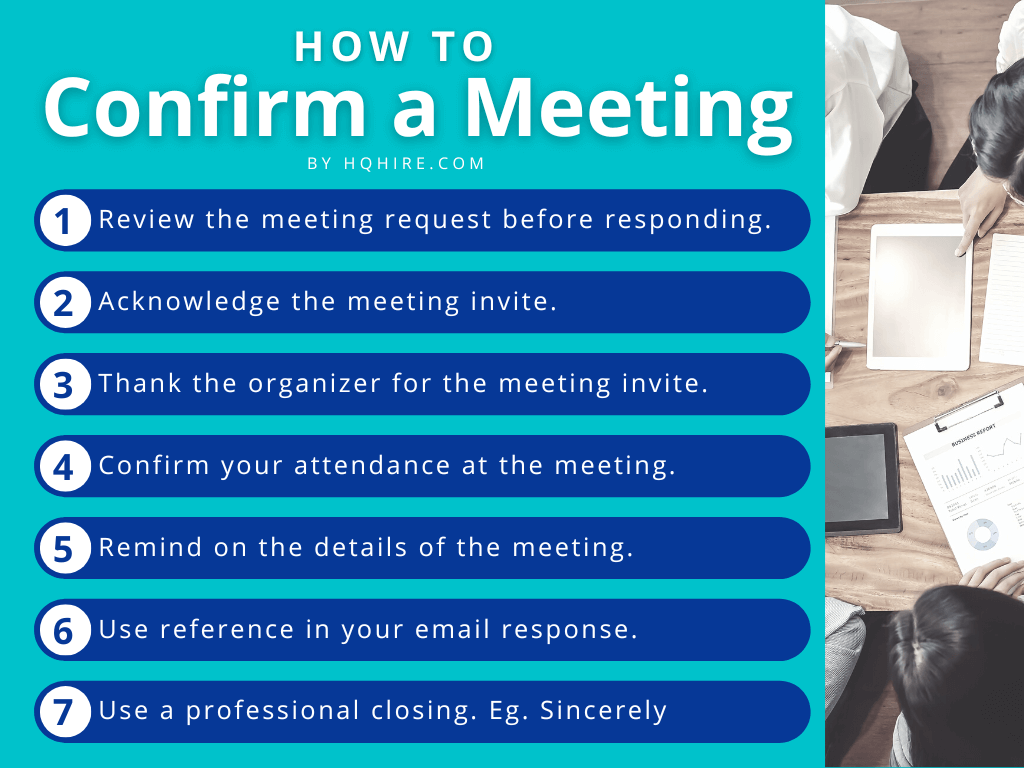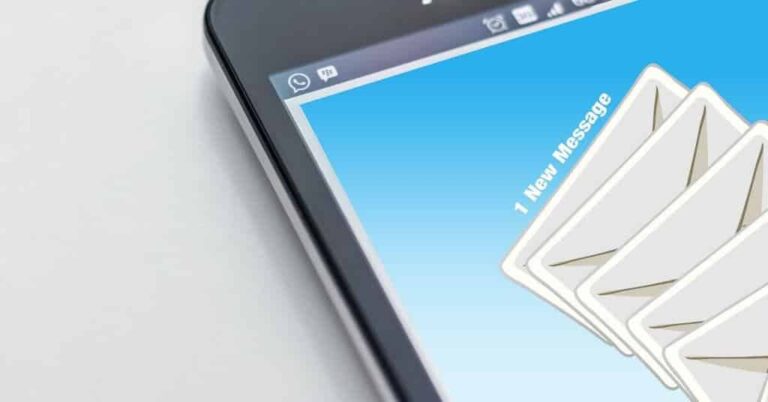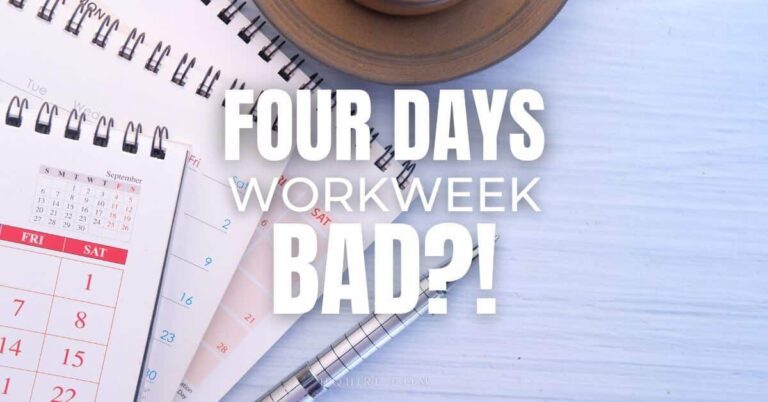Confirming a meeting by responding promptly and clearly to meeting requests is important for building rapport and being professional at work.
Quick response to confirm an appointment or meeting invite with a professionally crafted email shows respect to the organizer as well as other attendees.
Here is how you can confirm an appointment or meeting via text or email.
KEY TAKEAWAY
- Thoroughly review meeting invites before responding to grasp the purpose and details.
- Confirm attendance with a brief and polite response, expressing gratitude.
- Choose the appropriate communication mode based on the meeting’s formality.
- Promptly communicate scheduling conflicts, apologize, and suggest alternatives.
- If details are unclear, politely ask for additional information to prepare effectively.
How to Confirm a Meeting By Email
Knowing how to confirm a meeting via writing an email professionally is important if you want to prevent misunderstanding and make a great impression at work.
A confirmation email is one of the few most important emails you’ll need to know when you work in the office or, remotely.

1. Review the meeting request before responding
Take some time to read the meeting invitation before crafting a response to confirm a meeting or appointment.
Things to keep in mind on the important details before responding to the meeting requests.
- Read the invitation carefully.
- Know who is the organizer.
- Know who is the attendee.
- Understand the agenda of the meeting.
- Check your calendar.
- Know the location name as well as the time and date.
- Set priority on the meeting accordingly.
Confirming a meeting requires you to be clear and concise in your response, while you need to ensure you have all the information you’ll need to prepare for the meeting.
2. Acknowledge the meeting invite
Start your email by acknowledging their meeting invites. Acknowledgment of received of the email is a basic courtesy to the organizer of the meeting where it serves as an introduction to your email reply.
Example of acknowledgment to email invites
- “I’ve received the meeting request that you sent on…”
- “This is a reply to your meeting invite on…”
- “I am writing in response to your meeting invite on…”
- “I am writing to confirm my appointment…”
- “I’ll like to confirm the appointment…”
An acknowledgment is simply to recognize that the meeting invite has been received, but it does not require you have stated your decision made in regard to the organizer’s request.
3. Thank the organizer for the meeting invite
Being polite and thanking the organizer for the meeting invite is probably the best way to start an email response. This is especially true if the email invite is from an external party or someone who you barely know.
Having said so, no one will blame you for being too polite and thanking them for their effort in organizing the meeting.
Note: Thanking the organizer for their interest in meeting you is considered good business etiquette, and should be practiced for most responses to meeting invites.
Thank you for the invitation examples
- “I appreciate the invitation.”
- “Thank you for inviting me.”
- “Thank you for having me/us.”
- “Thank you for the meeting request.”
- “Look forward to seeing…”
- “Thanks for keeping me informed.”
- “I appreciate your interest in meeting me and setting up this meeting.”
Thanking the organizer for the meeting request should be done in the first paragraph. Thanking the organizer is often used as an acknowledgment of the meeting request.
4. Confirm your attendance at the meeting
Let the organizer know clearly and early in your response if you will attend the meeting. Confirmation of a meeting should be brief and specific using a professional format and formal language.
There are 3 types of replies to a meeting invite
- Accepting and confirming the meeting request
- Rejecting the meeting invite
- Tentatively accepting the meeting invite
Confirm meeting invites example
- “I am writing to confirm our meeting.”
- “I am writing to confirm my appointment.”
- “I am happy to confirm the meeting.”
- “I will want to confirm my appointment.”
- “This is to confirm the meeting.”
Rejecting meeting invites example
- “I am unable to attend the meeting on…”
- “My apologist that I will not be able to come for the meeting on…”
- “I will like to thank your invite but I am unable to attend the meeting set on…”
Tentatively accepting a meeting example
- “As there is a conflict in the meeting, I will try my best to attend the meeting if the previous meeting ends earlier.”
- “As I will be on a business trip, I may not be accessible to a stable internet connection. I will like to tentatively accept your meeting. Otherwise, I will be back in the office by [Date], if you decide to reschedule the meeting.”
- “I will like to tentatively accept the meeting due to a possible conflict of meeting during the scheduled time and date.”
5. Add a reminder on the details of the meeting
In your response to the meeting invite, you should add a reminder of the details of the meeting. In your reply, you should remind the organizer what are the date, time, and mode of how the meeting is organized.
Note: Reminder in your email response serves to prevent miscommunication on the details of the meeting.
Mode of meeting
- Interpersonal meeting. A face-to-face meeting where people meet at a certain location where you will communicate with your four senses; visual, audio, smell and touch.
- Virtual meeting. Web conferences are where people meet through online software transferring information between individuals. Communication will be performed by your two senses; visual and audio.
- Phone meeting. Communication between one or more individuals with only one sense; audio.
Example of a reminder on the details of the meeting
- “Will just like to confirm that the meeting will be held at [Location], on [Date] at [Time], is that correct?”
- “Just confirming some details of the meeting. It will be an online meeting on [Zoom/Microsoft Teams/WebEx] set on [Date] at [Time], am I correct?”
- “I will be attending the meeting, but just to confirm that we will be having the meeting at [Location], on [Date] at [Time], right?
- “I am looking forward to seeing you at [Location], on [Date] at [Time], do keep me informed if there is any changes.”
6. Use reference in your email response
When replying to a meeting invite, it is advisable to use the email reference as the subject title of your reply email. Using references in your email allows the email receiver to know what is this email about before opening the email to read its content.
The subject title with email reference starts with “RE”.
If you are replying to the meeting invites through Gmail, Outlook, or Yahoo, the email service provider will automatically add “RE:” into the subject line when you click “Reply” or “Reply All”.
7. Use a professional closing
While casual closing phrases might be fine if you are sending an email to a friend or exchanging communication with close colleagues. When sending an email at work, it is important to end with a formal closing.
Professional email closing examples
- “Best Regards”
- “Kind Regards”
- “Warm Regards”
- “Regards”
- “Best”
- “Respectfully”
- “Sincerely”
Meeting Confirmation Email Sample (Templates)
Meeting confirmation should be done professionally, and “OK” is not the right way to confirm a meeting invite. Here we have a few examples that you can use to reply to a meeting invite.
- Online meeting invite via email
- Phone meeting invite via email
- Interpersonal meeting invite via email
Online Meeting Confirmation Email Template
Subject: RE: Online meeting for ABC Project
Dear [Recipient’s Name],
Thank you for reaching out to me.
I would like to confirm our online meeting on [Zoom, Microsoft Teams, or WebEx] scheduled for the [Appointment Date] at [Appointment Time].
I appreciate your acknowledgment of the same, if this meeting time is still convenient for you, or if there are any changes.
Kind Regards,
[Your Name]
Phone Meeting Confirmation Email Template
Subject: RE: Phone meeting with [Executive name]
Dear [Name],
Thank you for your phone meeting invite.
I am writing to confirm our call on [Day], at [Time].
Per the email invitation, I will dial into the meeting at [Phone Number].
Please let me know if the information is correct, or keep me informed if there are any changes.
You can always get in touch with me through my contact details below:
- Email: yourname@email.com
- Phone number: (555) 555-1234
Regards,
[Your Name]
Meeting Confirmation Email Reply Template
Subject: RE: Meeting to discuss on [Topic]
Dear [Name],
Thank you for your meeting invite, and I am happy to accept the meeting.
I will just like to confirm our meeting at [Location], on [Day], at [Time], is that correct?
Please let me know if this time and location are still convenient for you, or if there are any changes.
Do also let me know of anything to do beforehand to best prepare for the meeting.
Best Regards,
[Your Name]
Examples of Meeting Confirmation
Face-To-Face Appointment Confirmation Email Sample
Subject: RE: Appointment with [Name]
Dear [Last Name],
Thank you for setting up the appointment [Appointment Name].
I would like to confirm the appointment scheduled on [Date] at [Time] at the [Appointment Location].
Please feel free to contact me if there are any changes and a new appoint is required to be made.
Best Regards,
[Your Name]
Meeting Confirmation Email to Client
Subject: RE: Meeting appointment with [Executive Name]
Dear [Client’s Last Name],
Thank you for your interest in discussing [Topic].
I would like to confirm our appointment scheduled on [Date] at [Time] at the [Location].
Please let me know if this time and location are still convenient for you, or if there are any changes.
Best Regards,
[Your Name]
Meeting Confirmation Email to Boss
Subject: RE: Meeting to discuss [Topic]
Dear [Boss’s Name],
Thank you I would like to confirm our meeting on [Date] at [Time] at the [Location].
Please let me know of anything to prepare beforehand, or if there are any changes.
Yours Sincerely,
[Your Name]
Meeting Confirmation Email on Behalf of Boss
Subject: RE: Meeting with [Executive Name]
Dear [Name],
My name is [Your Name], and I am reaching out to you on behalf of [Your Boss’s Name] to confirm his/her attendance at the meeting.
I would like to confirm the meeting is to be scheduled for the [Date] at [Time] at the [Location].
I appreciate your acknowledgment to let me know if this time and location are still convenient for you, or if there are any changes.
Regards,
Kind Regards,
[Your Name]
On behalf of [Boss’s Name]
Email to Confirm Meeting With Attendees
Subject: RE: Meeting for [Conference/Event Name]
Dear [Name],
Thank you for arranging this meeting.
I would like to confirm our attendance for the [Conference/Event Name]
Personnel who will be attending the [Conference/Event name] will be:
- [Person 1]
- [Person 2]
- [Person 3]
- [Person…]
I will like to confirm the [Conference/Event Name] will be held on [Date] at [Time] at the [Location].
Please feel free to contact me through my contact in this email.
I appreciate a similar confirmation from your side. Looking forward to meeting you.
Regards,
Kind Regards,
[Your Name]
What Is A Confirmation Email?
Confirmation email is a type of email where the organizers send to confirm important details such as appointment date and time with its attendees while preventing no-shows and wasting the time of other participants.
An appointment confirmation email is a special reminder to confirm your appointment. It serves to remind the other party you would like to confirm your appointment and will like to confirm all the important details related to the appointments.
Frequently Asked Questions (FAQ) For Confirming a Meeting
There are many questions revolving around confirming a meeting, and here are some of the most common ones. With that said, you should also know the best practices when confirming a meeting to ensure a seamless meeting experience.
Why Is It Important Confirm a Meeting or Appointment?
Confirming your availability to meet and let the host know that you are taking the meeting or appointment seriously. Additionally, conformational emails also serve as a reminder to the host of the upcoming meeting.
Note: Responding to a meeting invite is just being polite and professional.
Confirmation of the meeting or appointments can help you build rapport with the host, and shows that you are ready to give the necessary support to make the meeting productive.
Confirmation messages made through email, phone, or any other channels can help the organizer feel more confident about their scheduled meeting, and the number of attendees to the meeting.
This allows the meeting to become more effective and benefits all those who attend the meeting.
What Happen If You Don’t Confirm a Meeting or Appointment?
Not sending a confirmation email to the organizers can mean the following:
- Not wanting to attend the meeting.
- Not available to attend the meeting.
- Have no interest in the meeting.
- The organizer is not important enough to get an reply.
Not confirming your meeting appointment with the organizers will have a few dire consiquences:
- The organizers lose interest and consequently lose the desire of inviting you to the meeting even if the meeting will benefit you.
- Fail to confirm the meeting will consequently lose the message that is delivered through the meeting invites, as it will deems as “not important enough” to get an reply.
- The organizers may reschedule the meeting to another time and date not informing you on the changes, this may lead to a waste of your time.
When Should You Confirm a Meeting With Another?
You should confirm the meeting at least 3 days before the meeting so that the organizer will have sufficient time to prepare for the meeting. Oftentimes, early confirmation of the meeting will prevent miscommunication and allow sufficient time for any special arrangements to be made for the meeting to be fruitful.
Although, many “experts” may tell you to confirm the meeting invites the day before the actual meeting.
This practice can harm your relationship with the meeting organizer.
Note: Never confirm a meeting or an appointment, a day before, or a few hours before you are supposed to meet.
This practice can harm your relationship with the meeting organizer.
Note: Confirming your meeting 3 to 7 days before the meeting is a good rule to follow.
What Meeting Do You Need To Confirm The Appointment With Another?
With a rule of thumb, “do unto others what you want others do unto you”.
Regardless what meeting invests you are getting, it is always good to send confirmation on the appointment. The meeting invite can be from an administrative assistant, your boss, or an interview invitation made on the phone.
Confirming the appointment shows respect to the person sending the invite while giving you the opportunity to confirm on the important details prevent you from wasting your time.
Important appointments to send an confirmation emails:
- Interview invites send by your potential interviewer. An interview confirmation is a must for this form of emails.
- Meeting invites send by your boss or coworkers. An meeting confirmation is required to help you get prepared of all the documents that you may need for the meeting.
- Meeting invites send by your clients and customers. An meeting confirmation ensure that your clients and customers are aware of the agenda and important details of the meeting.
- Meeting invites send by someone you know or is affiliated with. A meeting confirmation is required to show that you care.
- Appointment invites send by your doctors etc. An appointment confirmation is required regardless if you are rescheduling for a new appointment or confirming the proposed appointment time and date.
Meeting invites that do not warrant an confirmation email:
- Email invites send by a scammer.
- Suspicious email invites send from an unknown email address.
Frequently Ask Questions
Join over 11,000+ achievers who are committed to achieving their career goals!






